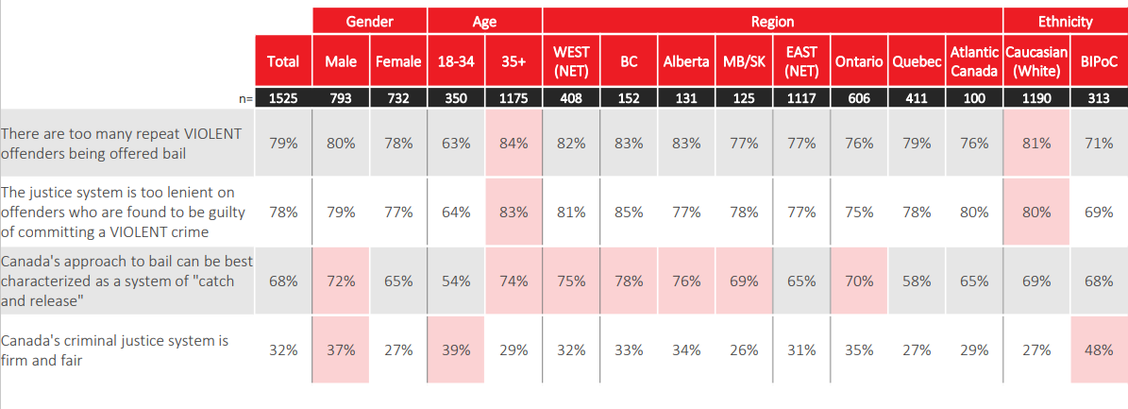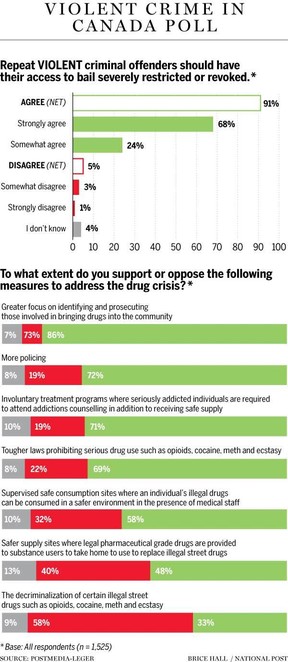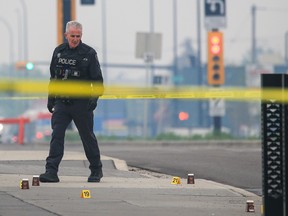Canada, Safe and Secure
"I think policy makers and decision-makers need to realize that there are some very strong sentiments being expressed on these issues [involuntary addiction treatment, criminal charge bail, decriminalization of drugs].""We're seeing large percentages of people saying things are getting worse.""I think there was a perception, correct or not, that safe injection sites would lead to a solution, and those problems are instead amplified probably ten-fold from where they were. So there's this frustration of, 'What else can we do. This isn't working'."Andrew Enns, executive vice-present, Leger Marketing

Little
wonder Canadians are fed up. Inflation is raging, the cost of consumer
goods sky-high, additional taxes on energy linked to the Trudeau
government's environmentalist agenda has sent the price of gas at the
fuel pumps soaring, homelessness is a growing concern, and more people
than ever before are turning to food banks. Canada's once-proud
universal health care system has been gutted; wait times for surgery,
for access to medical specialists have become dangerously inadequate.
The 911 emergency system is collapsing, ambulances are increasingly late
responding to calls, and so are police.
But
the latest poll by Leger Marketing looked at other acute concerns of
Canadians; that of growing crime rates, of growing addiction rates and
consequent deaths from overdosing. Fixes that governments have been
relying on have proven to be failures. Leaving the public frustrated and
angry. And those sentiments of failed government actions in addressing
these societal problems were emphasized on the latest poll.
The
status quo is unacceptable and the response of governments has been
inadequate to say the least. Canadian public opinion was found through
this latest poll to be completely opposite government priorities
channelled through programs that have proven to be worthless. The issues
of bail, involuntary addiction treatment, and the decriminalization of
drugs in a desperate attempt to ease the growing problems in society are
topmost in people's minds behind the cost of living.
A
clear majority of poll respondents agree the Canadian justice system is
mishandling bail, too lenient on violent criminals. Example: the
statement "there are too many repeat violent offenders being offered bail" had the agreement of 79 percent of the surveyed. The statement "the justice system is too lenient on offenders who are found to be guilt of committing a violent crime" was endorsed by 79 percent. While less than 32 percent agreed that Canada had a "firm and fair" system of justice.
On
the issue of strengthening bail, solid agreement was seen, with 82
percent of Western Canadians, 77 percent of Eastern Canadians, 80
percent of men, 78 percent of women, 81 percent of white Canadians and
71 percent of BIPOC (Black, Indigenous, People of Colour)
Canadians, reporting that too many violet offenders were given bail.
General agreement was seen on the viewpoint that Canada's top priorities
on criminal justice should be "violent crime", "illegal firearm possession" and "drug and substance abuse".

A
course has been adopted in Canada of setting aside law enforcement from
the equation of drug addiction, prioritizing harm reduction policies
with the like of safe consumption sites. Included was British Columbia's
experiment in decriminalizing personal use quantities of hard drugs
like heroin and cocaine. Canadians indicated a more nuanced view of how
Canada's climbing rates of fatal overdose could be addressed.
Major support was expressed (58 percent) for "supervised safe consumption sites",
yet almost all respondents wanted to have drug dealers prosecuted and
chronic addicts to be mandated to the necessity of treatment. Over 7 in
ten respondents opted for "more policing" on drugs, the highest being expressed (at 81 percent) in British Columbia, the recognized epicentre of the overdose crisis. Asked should Canada focus on "identifying and prosecuting those involved in bringing drugs into the community", 86 percent agreed.
"There
was one [safe consumption site] when we came into office in 2015, now
there are dozens and dozens and dozens across the country and they are
saving lives significantly", boasted Prime Minister Justin Trudeau. He slammed it as "unfortunate" and "anti-science"
when Alberta began the pursuit of a treatment-centered approach to
address its overdose crisis. His boast is a hollow sham; lethal
overdoses, in the face of 'dozens and dozens' of 'safe injection' sites,
are on a pronounced upward curve. Moreover, the 'safe' opioids handed
out at the sites are leaking onto the streets.
Although
involuntary treatment for chronic addicts has been denounced as extreme
by the Canadian political and public health establishment, it was
endorsed by 71 percent of poll respondents who agreed "involuntary
treatment programs where seriously addicted individuals are required to
attend addiction counselling in addition to receiving safe supply", sounded like a solution.

As
for the criminal justice system reflected by government policy, opinion
polls find majority support for capital punishment which since the
1970s was officially abolished in Canada. Incarceration and detention
issues have hardened in the wake of recent murders and assaults
committed by suspects either on bail or recent early releases from
prison. Random fatal stabbings by people on parole for similar random
attacks infuriate the public.
The
fatal shooting of an Ontario Provincial Police constable by a repeat
violent offender on bail, prompted a letter co-signed by all 13 Canadian
premiers urging the federal government to reform bail (the Trudeau government had loosened bail issues after the previous Conservative-led government had tightened them) and take steps to get violent criminals "off the streets".
Canadian bail policies were described as a system of "catch and release"
by over two-thirds of poll respondents, with white respondents at 69
percent and non-white respondents, 68 percent. If offenders keep
committing crimes while on bail, in the opinion of the survey
respondents, stop giving them bail. 92 percent of poll respondents
endorsed the statement "repeat violent criminal offenders should have their access to bail severely restricted or revoked".
 |
Labels: Bail, Crime, Drug Addiction, Drug Overdoses, Government out of sync with Public Sentiments/Values in Canada, Leger Poll

<< Home